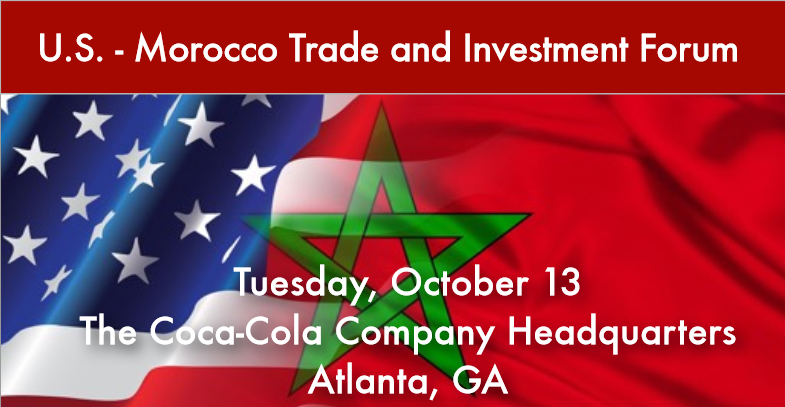Updated
Morocco-US Businesses Set for Fall Meet-ups – Jean R. AbiNader
Jean R. AbiNader, MATIC
September 11, 2015
Events in Atlanta and Rabat Underscore Trade & Investment Opportunities
While other countries in the Middle East and North Africa (MENA) are struggling to get their economies on course, either because of downturns in commodity prices or political instability, Morocco continues to keep its focus on stimulating economic growth. One key part of that strategy is attracting higher levels of Foreign Direct Investment (FDI) and new export markets. It is clear that proactive trade and investment promotion takes more than getting listed on the internet or having a great website. These help, yet regardless of what “experts” might say about how to do business overseas, in our experience, more companies rely on what competitors and colleagues have to say than on “how to do business” materials.
This is why face-to-face contact is so important – despite cultural and language challenges. Morocco has been working over the past decade to improve its access to US markets through bilateral trade and investment delegations, trade shows, conferences, seminars, and exchange programs. Of course, just as US businesses struggle with French dominating Morocco’s business language, Moroccan companies are working to acquire staff and expertise in English. How does one measure success? One evident indicator of the growing mutual interest in US-Morocco trade and investment is the growing number of conferences being held in English in Morocco on topics ranging from tourism and renewable energy to ports infrastructure and medical equipment.
And in the US, the number of promotion events featuring Morocco is also increasing. For example, as part of a Middle East and North Africa Consultants Association (MENACA) program September 22-29 on doing business with Arab countries with Free Trade Agreements (FTAs), opportunities in Morocco will be presented to companies in Chicago, Milwaukee, Madison, and Minneapolis. These events include one-on-one sessions for businesses to meet with country representatives.
On to Atlanta and Rabat
On October 13, the US-Morocco Trade & Investment Forum will be held at the headquarters of Coca-Cola in Atlanta, GA. Building on the success of last year’s event in Dallas, the Forum will feature leaders from the government and private sector in five key areas: energy, including renewables; banking and financial services; agriculture; water management; and automobile and aeronautical manufacturing. The energy sector will be represented by senior officials from MASEN, the solar power agency; ONEE, the national water authority that overseas hydro and wind power projects; ADEREE, the country’s leading energy research and energy efficiency planning agency; and ONHYM, responsible for hydrocarbons and mining.
Manufacturing will feature US companies such as Boeing, Polydesign, and Morocco’s automobile trade association AMICA. Automobile and aircraft components are the fastest growing export segment in the country, providing thousands of jobs and attracting more than 300 suppliers to the major industrial parks in Tangier, Casablanca, and Kenitra. These facilities are well serviced by the transportation network in Morocco, including the Tangier-Med port, which continues its rapid growth, on schedule to be the largest container terminal handler on the Mediterranean.
Another strong performer in the Moroccan economy is the banking and financial services sector, which has benefited from the country’s conservative approach to managing its borrowing and budgets. In addition, Morocco has positioned itself successfully as a dynamic and comprehensive platform for doing business in Africa. Its airline flies to more than 30 African cities; its banks dominate customer services in seven countries; under the direction of King Mohammed VI, who has made economic relations with Africa a priority, more than 80 treaties have been signed with African countries covering economic and human development priorities; and more than a half-dozen African-centric conferences are held every year in Morocco on topics ranging from agriculture to security and investments.
The financial sector will be well-represented in Atlanta by the Casablanca Stock Exchange; CDG Capital, the leading public sector investor; Casablanca Finance City, the home of companies providing services for doing business in Africa; AMDI, the Moroccan investment development authority; and key banks, including Citigroup, Inc. With strong balance sheets, networks of contacts throughout the region, extensive links to US and multilateral financing and insurance agencies, and well-respected leadership, Morocco’s financial services sector will only continue to expand and be successful.
The following month, November 12-13, the Third Annual Morocco-US Business Development Conference, held under the auspices of the Economic Committee of the Morocco-US Strategic Dialogue, will give Moroccan companies the opportunity to engage their US counterparts in Rabat. The program will maximize opportunities for site visits, setting aside the first day for presentations and the second for travel to locations of solar and wind farm projects, as well as automobile manufacturing facilities. The energy and automotive manufacturing sectors will be highlighted in the program, and there will be a special session on doing business with Africa from Morocco.
Morocco is in a race to stay ahead of its competitors. Its evolving incentives for investors, growing sophistication in export production, and continuing improvements in the business environment are indicators that it is not taking anything for granted. American companies will find ready and qualified partners in Morocco.

